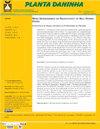Interference Periods of Raphanus raphanistrum L. in Sunflower Crop
IF 0.8
Q3 Agricultural and Biological Sciences
引用次数: 1
Abstract
ABSTRACT: Raphanus raphanistrum L. (wild radish) stands out among the weeds that cause greatest damage to the sunflower crop, due to the development cycle and adaptability. The objective of this research was to determine interference periods of sunflower interacting with wild radish, and the effects of competition on yield and its components. The experiment was conducted in the field in a randomized block design with four replications. The treatments were arranged in a factorial design with factor A composed of wild radish coexistence or control in sunflower, and factor B, for eight periods (0, 7, 14, 21, 28, 35, 42 and 135 days after crop emergence). It was evaluated height, diameter of chapters, achene yield and dry matter of weeds and crop. The presence of wild radish adversely affects the accumulation of dry mass, head diameter, thousand grain weight and reduces sunflower productivity when the wild radish interacts during the whole crop cycle, but does not affect on plant height. Chemical control of wild radish may be adopted at the end of period prior to interference, which for sunflower crop is 13 DAE, and the application is sufficient to avoid weed interference until the end of the total period of interference prevention which occurs until 17 days after crop emergence.向日葵作物中Raphanus raphanisstrum的干扰期
摘要:野生萝卜(Raphanus raphanistrum L.,简称Raphanus raphanistrum L.)因其生长周期和适应性而成为对向日葵作物危害最大的杂草之一。本研究的目的是确定向日葵与野生萝卜相互作用的干扰期,以及竞争对产量及其成分的影响。试验在田间进行,采用随机区组设计,4个重复。采用因子a和因子B的析因设计,分别在作物出苗后0、7、14、21、28、35、42和135 d进行处理。对杂草和作物的高、章径、瘦果产量和干物质进行了评价。在整个作物周期中,野生萝卜的存在对向日葵干质量、穗直径、千粒重的积累产生不利影响,并降低了向日葵的产量,但对株高没有影响。可在干扰期结束时对野萝卜进行化学防治,向日葵作物为13 DAE,施用量足以避免杂草干扰,直至作物出苗期结束,即作物出苗期结束后17天。
本文章由计算机程序翻译,如有差异,请以英文原文为准。
求助全文
约1分钟内获得全文
求助全文
来源期刊

Planta Daninha
Agricultural and Biological Sciences-Plant Science
自引率
0.00%
发文量
0
审稿时长
16 weeks
期刊介绍:
Planta Daninha is a scientific journal published by the Brazilian Society of Weed Science (SBCPD - Sociedade Brasileira da Ciência das Plantas Daninhas). Papers submitted for publication must be sent through an electronic system, on http://www.scielo.br/pd. Works may be written in Portuguese, English, or Spanish, and will be accepted after being reviewed and approved by the Editorial Board. Only papers that have not been published or submitted for publication in other media will be accepted. Articles in Portuguese will be translated to English after being properly corrected and authorized by the authors. Planta Daninha has with goal to publish genuine technical-scientific papers and literature reviews from a critical perspective on Biology, weed management, and related topics.
 求助内容:
求助内容: 应助结果提醒方式:
应助结果提醒方式:


